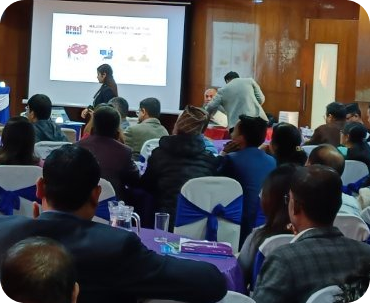May 30, 2023 DiMaNN, in collaboration with DPNet, NEAR, and Samarpan Academy Institute of Crisis Management Studies (ICMS), recently organized a guest lecture session focusing on the significance of the Grand Bargain and Localization in the humanitarian field. The event featured Ms. Sahida Arif, a respected humanitarian and resilience expert, who shared insights as the Regional Representative at NEAR (Network for Empowered Aid Response). The session aimed to promote fair partnerships, empower local actors, and improve humanitarian aid systems.
Lecture Details: The lecture, held on May 30, 2023, was attended by esteemed individuals, including Mr. Surya Bahadur Thapa, Chairperson of DiMaNN/DPNet; Mr. Sanat Kumar Basnet, Retired Inspector General of APF Nepal and Chairperson of ICMS; Dr. Raju Thapa, Vice Chair of DPNet and Member of Board of Directors, ICMS; Mr. Bishnu Pd. Timilsena, General Secretary of DiMaNN; and Mr. Pratap Maharjan from Action Aid Nepal. The program, moderated by Dr. Kishor Adhikari, Principal of ICMS, saw the participation of 44 individuals from various organizations, including ICMS.
Presentation Highlights: Dr. Kishor Adhikari commenced the session with a warm welcome and an introduction to the program. Ms. Sahida Arif then delivered an insightful presentation, starting with an overview of the NEAR network. She highlighted the network’s objective of promoting fair partnerships within the aid system and emphasized the importance of local participation in development and disaster management. Ms. Arif underlined the critical role played by local organizations in responding swiftly to crises and saving lives during emergencies.
Moreover, Ms. Arif shed light on the Grand Bargain, an agreement that originated from the World Humanitarian Summit preparations in 2016. She explained that the Grand Bargain is a partnership between major donors and humanitarian organizations committed to improving the efficiency, effectiveness, and accountability of humanitarian action. Ms. Arif discussed the evolution of the Grand Bargain, including the endorsement of the Framework and annexes for the Grand Bargain 2.0 in 2021.
Ms. Arif elaborated on the priorities of the Grand Bargain 2.0, which include achieving better humanitarian outcomes through enhanced efficiency, effectiveness, and accountability. She emphasized the importance of quality funding and support for local responders’ leadership, delivery, and capacity, as well as the participation of affected communities. The Grand Bargain has grown from involving five major donors and six UN agencies to having 66 signatories, including member states, NGOs, UN agencies, Red Cross/Red Crescent movements, and intergovernmental organizations. These signatories are actively implementing commitments across five workstreams, covering areas such as transparency, local and national responder support, joint needs assessments, participation revolution, and harmonized reporting requirements.
Discussion and Conclusion: The session concluded with an open discussion, where participants raised questions about the capabilities of local NGOs, the involvement of local actors, and mechanisms to enhance their capacity. Ms. Sahida Arif provided insightful answers, referring to core documents such as “How to Implement the Grand Bargain Commitments at The Country-Level?” and “The Grand Bargain 2.0 Endorsed framework and annexes.”
Dr. Kishor Adhikari summarized the session, highlighting the significance of Ms. Arif’s lecture in promoting effective humanitarian aid delivery at the local level. He expressed gratitude to Ms. Arif for her valuable insights and acknowledged the crucial role played by local communities in addressing challenges.
In closing, Ms. Anita Dhakal, a student from ICMS, delivered a vote of thanks to Ms. Arif for her enlightening session. She expressed gratitude for sharing expertise and providing valuable insights. Ms. Dhakal also extended appreciation to all the participants for their active engagement and presence in the program.


Leave A Comment